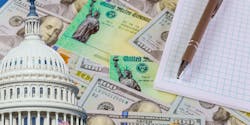US Stimulus Passed After Extended Negotiation, Veto Threat
Late December 27, President Trump signed the combination government funding and COVID-19 stimulus bill sent to him by Congress, backtracking on threats to veto it.
The new law will avert a government shutdown as well as inject new funds into previously-existing COVID relief programs, including the Payroll Protection Program and expanded unemployment benefits, which expired Saturday.
The bill apportioned $284 billion more to the PPP, reauthorizes it through March 31, 2021. According to the National Association of Manufacturers, the bill also expanded how businesses can spend loans provided through the PPP and simplifies its loan forgiveness process.
The pandemic unemployment assistance program, which provides unemployment benefits to some employees not ordinarily eligible for benefits, was also renewed. The PUA officially finished Saturday but will now be reopened: the delay in signing means that the 14 million people enrolled in the program will miss out on a week of benefits, according to Washington Governor Jay Inslee.
The National Association of Manufacturers praised aspects of the bill it said were priorities for manufacturing, including a revamp of U.S. energy policy, a provision for phasing out greenhouses gases used in refrigeration, and research and development programs for greenhouse gas-reducing technology in the power sector.
In a statement, Jay Timmons, CEO of NAM, dismissed those who treated the bill as controversial to “score political quotes” and said, “the bottom line is manufacturers—and all Americans—need relief now.”
The issue of individual stimulus was key to the political fight over the spending act. The March CARES Act included a provision that gave out checks for $1,200 to those making under $75,000. The December spending bill cut that payment in half to $600. That led President Trump to threaten to veto the bill, calling it a “disgrace” and saying the payments should be increased to $2,000.
That put him with odds against members of his own party who had previously argued against the earlier $1,200 payment.
On Sunday, facing pressure from both parties to sign the measure, President Trump signed the bill at his club in Mar-a-Lago and, in a written statement, said “much more money is coming.”
About the Author
IW Staff
Find contact information for the IndustryWeek staff: Contact IndustryWeek
